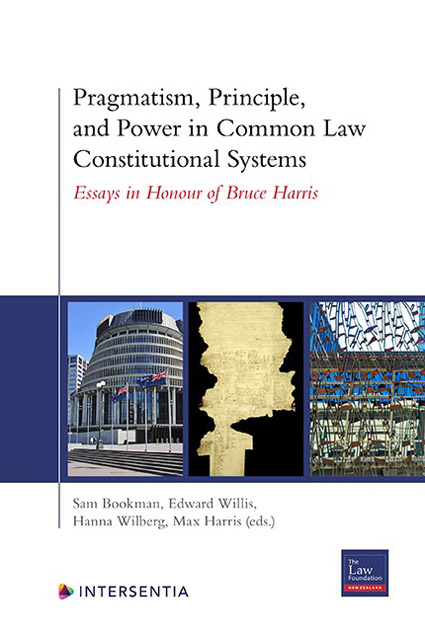 Pragmatism, Principle, and Power in Common Law Constitutional Systems
Pragmatism, Principle, and Power in Common Law Constitutional Systems Book contents
- Frontmatter
- Foreword
- Preface
- Contents
- The Writings of Professor Bruce Harris
- List of Cases
- List of Contributors
- Introduction
- Part I The Nature of Executive Power
- Part II Issues Concerning The Judiciary: The Nature of Judicial (and Executive) Power
- Part III Issues Concerning The Judiciary: Creativity and Pragmatism in Judicial Method
- Part IV Issues Concerning The Judiciary: Judicial Appointment and Accountability
- Part III The Nature of Unwritten Constitutions and Their Future
- Index
Judicial Activism and Restraint, New Zealand Style: Three Case Studies in Controversy
Published online by Cambridge University Press: 19 November 2022
- Frontmatter
- Foreword
- Preface
- Contents
- The Writings of Professor Bruce Harris
- List of Cases
- List of Contributors
- Introduction
- Part I The Nature of Executive Power
- Part II Issues Concerning The Judiciary: The Nature of Judicial (and Executive) Power
- Part III Issues Concerning The Judiciary: Creativity and Pragmatism in Judicial Method
- Part IV Issues Concerning The Judiciary: Judicial Appointment and Accountability
- Part III The Nature of Unwritten Constitutions and Their Future
- Index
Summary
INTRODUCTION
For many years Bruce Harris's office shelves sported a series of boxes containing his public law materials – ‘Parliamentary Supremacy’, ‘the executive’, ‘Third Source’, and the like. Last box in line was ‘The Future’. Less well-thumbed than the others, it was full of things yet to happen. Naturally, it was difficult to resist asking Bruce what was in it.
Then, and indeed still, talk of constitutional futures for New Zealand generally turned to well-worn conversation starters. Should there be a formal ‘written constitution’? Should it include a ‘higher law’ bill of rights enabling judicial invalidation of inconsistent legislation? Should it contain economic and social rights and protections for the environment? Should we become a republic? What sort of constitutional reckoning with the Treaty of Waitangi will generate a consensus? Perhaps these questions never change; it is just that over time different people come to answer them. At some point political circumstances may well mean that the answers produced by that generation become the new constitutional settlement.
Bruce explored these topics in a valuable 2004 article titled “The Constitutional Future of New Zealand”. His focus was pragmatic and process oriented. Pointing to the difficulty of constitution-making in times of peace and harmony, he argued for a programme designed to encourage engagement by the citizenry in constitutional matters. As it transpired, in 2011 a Constitutional Advisory Panel was appointed by the National Government, producing a report in 2013 that advanced ‘a way forward for future discussions about the constitution’. It is fair to say that this report, like others before it, sank without trace, confirming Bruce's point that constitutional conversations are not just difficult to start but fizzle out quickly.
Numerous constitutional futures are, of course, possible. One is the continuing evolution of the so-called ‘unwritten constitution’ we have. This evolution already means the New Zealand constitution is not the same as it was thirty or fifty years ago. When the political climate does demand some sort of explicit constitutional reform, it will inevitably be against the backdrop of the constitutional understandings that we have reached at that stage. There may be conscious departures from some and deliberate preservation or adaptation of others.
- Type
- Chapter
- Information
- Pragmatism, Principle, and Power in Common Law Constitutional SystemsEssays in Honour of Bruce Harris, pp. 135 - 168Publisher: IntersentiaPrint publication year: 2022


